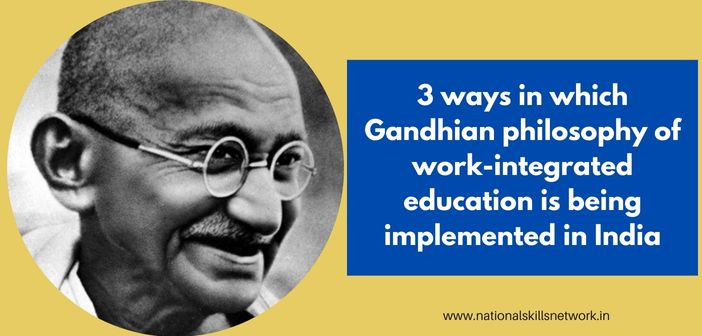“By education, I mean an all-round drawing out of the best in child and man – body, mind and spirit. Literacy is not the end of education nor even the beginning… I would, therefore, begin the child’s education by teaching it a useful handicraft and enabling it to produce from the moment it begins its training. I hold that the highest development of mind and the soul is possible under a such system of education” – Mahatma Gandhi.
Mahatma Gandhi always closely associated education with the socioeconomic development of the country and emphasised the importance of vocational education and work-integrated learning.
- He believed vocational education and training stimulate the human mind for creative thinking, learning by doing and thereby promoting the dignity of manual labour.
- He strongly advocated work-integrated learning to be part of the education curriculum right from the primary level to the higher education level.
Over the years, India has taken several initiatives and implemented many ideas along the lines of Gandhian ideology. Against the backdrop of the National Education Policy 2020, these initiatives and ideas have also been constantly evolving to meet the current challenges of implementing work-integrated education.

Let us look at the three ways in which the Gandhian philosophy of work-integrated education is being implemented in India to meet contemporary challenges in the evolving ecosystem:
1.Skill Hubs
Ministry of Skill Development and Entrepreneurship (MSDE) in collaboration with the Ministry of Education (MoE) has planned to implement the ‘Skill Hub Initiative’ under Pradhan Mantri Kaushal Vikas Yojana 3.0 (PMKVY 3.0). Skill Hubs are nodal skill centres that provide skill development and vocational training opportunities to the target population from class 6-8th (introduction to world-of-work through orientation, industry visits, bag-less days), 9th to 12th (aimed at exposing students to skill development avenues), school dropouts and out-of-education (aimed for academic credit, mainstreaming back to education and or apprenticeship and employment linkages).
Over a period, these Skill Hubs will associate with adjoining education and skilling institutions (spokes) over a district, or a cluster of adjacent districts, to provide access to skill development training at the hub location or at the spoke location.
2. Professors of Practice
Making higher education work-integrated by building in vocational components has been a priority since the launch of the National Education Policy (NEP2020). University Grants Commission (UGC) has recently issued guidelines for engaging the Professors of Practice.
Professor of Practice is a faculty position which can be filled by industry and professional experts even without formal academic qualifications. They will now be allowed in higher education institutions. Through this initiative, education and skill training institutions will be able to bring real-world practices and experiences into the classrooms in creating awareness among the students on industry-relevant skills, and curriculum and be able to develop work-integrated methodology of teaching and learning.
3. Bagless days and craft-centric education
The National Education Policy 2020 suggested that students should participate in at least a 10-day bagless period sometime during classes 6-8, where they intern with local vocational experts such as carpenters, gardeners, potters, artists, etc. Similarly, the policy also suggested that internship opportunities to learn vocational subjects may be made available to students throughout classes 6 -12, including holiday periods. These vocational courses will also be made available online.
While these are the three ways in which the Gandhian philosophy of work-integrated education is being implemented in India, let us revisit some of the articles and presentations from NSN that have reflected Gandhi’s ideas on vocational education and skill development. These have sparked various discussions and decisions on educational policy and practice.
Mahatma Gandhi on the importance of vocational education and skill development
Gandhiji was the first to advocate aligning education with an industry-oriented curriculum. NEP 2020, by adopting these principles, has rekindled enthusiasm for skills and vocational training and made learning outcome-based and industry-relevant. Gandhian principles of craft-centred education connect the efforts to balance our educational system by boosting the potential for skilling. Mahatma Gandhi focused on manual and productive work as an essential primary education component. Ideas like learning by doing, work-integrated learning, respect for manual skills, and self-reliance through sustainable livelihoods engrain his philosophy.
In the year 2020, we presented an ‘NSN Connect’ episode on implementing Gandhian ideas for enhancing vocational and skill-based education in India. In this presentation, we extensively spoke about modernising crafts and its skills with the aid of technology, exploring and understanding local needs, and providing training as per the demands of schools and colleges in rural and urban regions, with a focus on educating local youth for the needs of the local community at the village and district levels.
Team NSN organised a webinar on “Head, Hand and Heart”: Relevance of craft-centred education for 21st-century skills, on the occasion of Gandhi Jayanti 2021 to highlight the importance and potential of handicrafts, toys, and crafts in enabling livelihoods, empowering youth, and boosting the economy.
The eminent speakers in the webinar emphasised the relevance of craft-centred education for 21st-century skills of children’s cognitive skills, artisans’ livelihoods, innovative measures to make skilling aspirational for students from the school level, and gender equality in the handicraft sector.
The speakers also emphasised that the primary level of education and exposure to skills are the significant actions that we must take to improve the education system and to be able to move artisans from a state of subsistence to a state of sustainable livelihood. Introducing student internships and entrepreneurship concepts at the school level help in creating opportunities for artisans to make a living.
Subscribe to our YouTube channel for more updates:
Subscribe on YouTube



